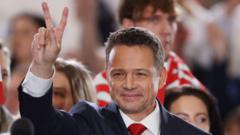In a closely contested presidential election in Poland, Warsaw Mayor Rafal Trzaskowski secured a slight lead over conservative candidate Karol Nawrocki, indicating a significant political race ahead. The state electoral commission reported that Trzaskowski garnered 31.3% of the vote, while Nawrocki closely followed with 29.5%. Due to none of the 13 candidates achieving more than the required 50% of the votes, a second-round run-off is slated for June 1.
Warsaw's Liberal Mayor Rafal Trzaskowski Leads in Presidential Vote but Faces Run-off

Warsaw's Liberal Mayor Rafal Trzaskowski Leads in Presidential Vote but Faces Run-off
Rafal Trzaskowski, the liberal mayor of Warsaw, emerges as a front-runner in the Polish presidential election but awaits a critical run-off against his conservative opponent.
With a voter turnout exceeding 67%, Trzaskowski encouraged his supporters at a rally in Sandomierz, expressing confidence in their potential victory, although he acknowledged the arduous path ahead, emphasizing the need for determination and collaboration with Prime Minister Donald Tusk's coalition. Among his pledges are plans to reform Poland’s strict abortion laws and the judiciary system, which has faced scrutiny since its politicization by the prior government.
Trzaskowski did not meet pre-election forecasts, which had him leading Nawrocki by a narrow margin of 4-6%. The role of the Polish president, primarily ceremonial, includes the power to veto government legislation, a significant concern for Tusk’s coalition which lacks a majority in parliament. Previous presidential vetoes from incumbent Andrzej Duda have hampered Tusk’s ability to fulfill campaign promises.
Nawrocki, despite being relatively unknown nationally prior to his candidacy, called on voters from the far-right segments to join him in opposing Tusk's government. His campaign thrives on traditional values, appealing especially to conservative and family-oriented voters, making the upcoming run-off a pivotal moment. The electoral dynamics will now focus on who can effectively mobilize their base, alongside appealing to supporters of other coalition candidates and navigating the rise of far-right factions—many of whom remain disenchanted with the mainstream parties.
As the political landscape remains fluid, the outcome of this election could profoundly impact Poland's future direction, particularly regarding its governance and social policies.
Trzaskowski did not meet pre-election forecasts, which had him leading Nawrocki by a narrow margin of 4-6%. The role of the Polish president, primarily ceremonial, includes the power to veto government legislation, a significant concern for Tusk’s coalition which lacks a majority in parliament. Previous presidential vetoes from incumbent Andrzej Duda have hampered Tusk’s ability to fulfill campaign promises.
Nawrocki, despite being relatively unknown nationally prior to his candidacy, called on voters from the far-right segments to join him in opposing Tusk's government. His campaign thrives on traditional values, appealing especially to conservative and family-oriented voters, making the upcoming run-off a pivotal moment. The electoral dynamics will now focus on who can effectively mobilize their base, alongside appealing to supporters of other coalition candidates and navigating the rise of far-right factions—many of whom remain disenchanted with the mainstream parties.
As the political landscape remains fluid, the outcome of this election could profoundly impact Poland's future direction, particularly regarding its governance and social policies.



















